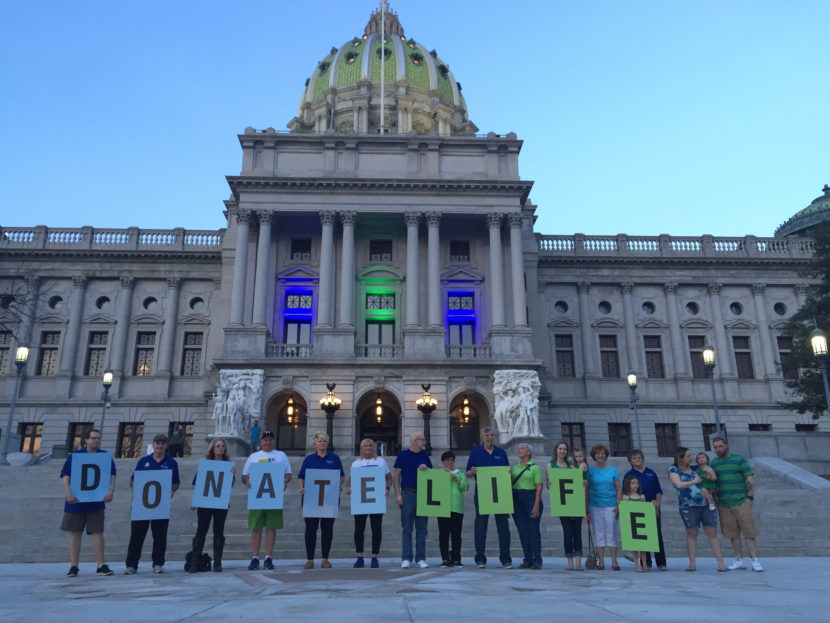
Gift of Life Ambassadors celebrate Donate Life Month at the Capitol Building in Harrisburg, PA
HARRISBURG, Oct. 11 — Pennsylvania’s donation and transplantation community applauded lawmakers for passing Senate Bill 180, the Donate Life PA Act, to update Pennsylvania’s organ donation law. The Donate Life PA Act was first introduced in 2010. More than 7,300 people in Pennsylvania currently are on the waiting list for an organ transplant.
The bill passed unanimously in the State House Wednesday and passed unanimously in the State Senate last week.
The Center for Organ Recovery & Education (CORE) in Pittsburgh and Gift of Life Donor Program in Philadelphia are the Commonwealth’s two non-profit, federally-designated organ procurement organizations. They perform the life-saving mission of coordinating the donation and transplantation of organs and tissues.
“On behalf of 7,300 people waiting for an organ transplant, and their families, we thank lawmakers for working together to pass this legislation,” said Howard M. Nathan, President and CEO of Gift of Life Donor Program. “We also recognize the commitment of countless volunteers, stakeholder groups and state agencies, whose efforts helped to bring this bill to final passage. While the process was long, the final result is a bill that will save lives.”
“This is a good day for thousands of families across Pennsylvania,” said Susan Stuart, President and CEO of CORE. “Our state has a distinguished record of advancing donation, including pioneering medical procedures and passing legislation in the early 1990s that became a model for other states. The Donate Life PA Act is another important step forward and brings Pennsylvania in line with national best standards.”
Senate Bill 180, the Donate Life PA Act:
-
- Adds Pennsylvania to the group of 47 other states to adopt the Uniform Anatomical Gift Act (UAGA), which aims to standardize best clinical practices nationwide.
-
- Increases opportunities for adults to register as organ donors.
-
- Provides for all public high schools (grades 9 through 12) to have access to a model curriculum about donation and transplantation.
-
- Ensures a full assessment of organ donation potential by county coroners and health care professionals through on-site meetings and that the reasons for any denial of organ donation are documented.
- Increases opportunities to voluntarily contribute to The Governor Robert P. Casey Memorial Organ and Tissue Donation Awareness Trust Fund, which provides for organ donation education and bereavement counseling services to donor families.
About Gift of Life Donor Program
Gift of Life Donor Program is the non-profit, federally-designated organ procurement organization, serving 11.2 million people across Delaware, southern New Jersey and the eastern half of Pennsylvania. Its annual donation rate ranks among the highest in the world. Since 1974, Gift of Life has coordinated more than 46,000 life-saving organs for transplant, and approximately one million tissue transplants have resulted from the generosity of donors and their families. One organ donor can save the lives of up to eight people, and a tissue donor can enhance the lives of up to 75 others. For more information or to register, click here.
About the Center for Organ Recovery & Education (CORE)
The Center for Organ Recovery & Education is one of 58 federally designated not-for-profit organ procurement organizations (OPOs) in the United States, serving more than five million people in western Pennsylvania, West Virginia and Chemung County, NY. Like all OPOs, CORE coordinates the recovery and matching of organs, tissues and corneas for transplant within our service region and works tirelessly to create a culture of donation within the hospitals and communities we serve. CORE’s goal is to end the deaths of those on the transplant waiting list, all the while maintaining integrity for the donation process, dignity for the donors, and compassion for their families. For more information or to register, visit core.org.
